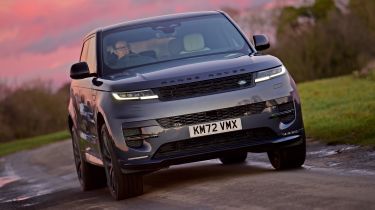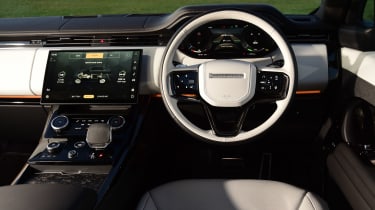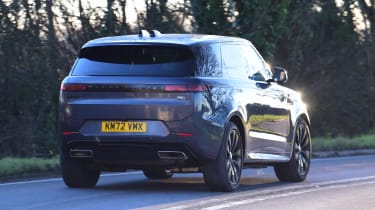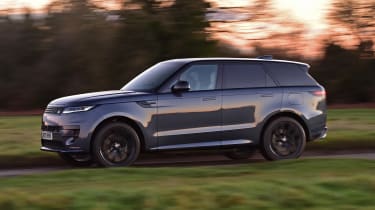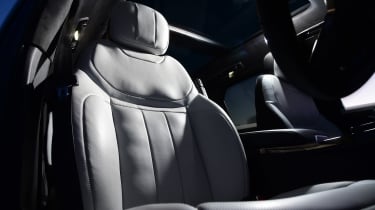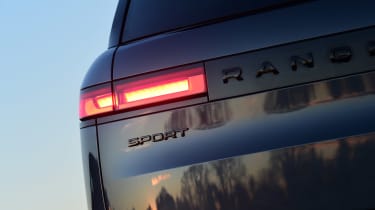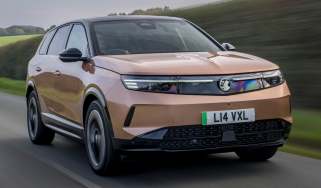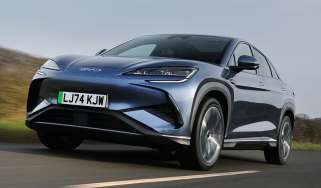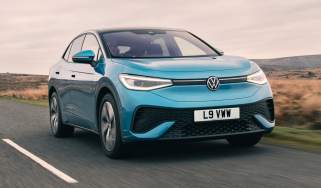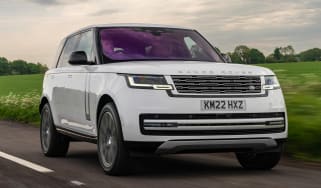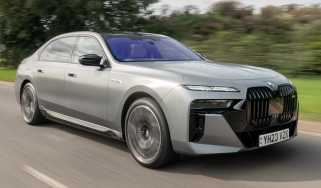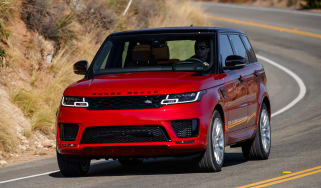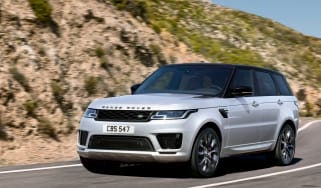Range Rover Sport PHEV review
“The Range Rover Sport PHEV is luxurious and smooth to drive and offers certain drivers lower running costs, too”
Pros
- Long all-electric range
- Low company car tax
- Luxurious and good to drive
Cons
- Expensive
- Large external dimensions
- Less suitable for regular long-distance trips
Verdict - Is the Range Rover Sport PHEV a good car?
The Range Rover Sport PHEV is pricey, but for certain people it makes more sense than other versions. If you can charge up at home and make use of the 70-mile electric range most of the time - which is probably most people with the budget for one of these - then you could save quite a bit of money on fuel and enjoy near-silent running, smooth performance and low tax costs. If you do lots of long-distance trips it’s not ideal, but for daily driving, the plug-in model is fantastic.
Range Rover Sport PHEV models, specs and alternatives
The Range Rover Sport plug-in hybrid (PHEV) is the electrified version of the luxury SUV, available in two forms: P440e and P510e. Both models use petrol engines alongside electric motors to bring low emissions (and low company car tax as a result) as well as quiet driving and the potential for big fuel savings.
The Sport is now in its third generation and the plug-in models are better than ever, offering more electric range than before as well as greater comfort, tech and handling than the previous versions.
All versions of the Range Rover Sport PHEV use the same 3.0-litre petrol engine under the bonnet, but the P440e model has 434bhp and the P510e version has 503bhp thanks to different outputs from their electric motors. The P510e has more torque too, a highly impressive 700Nm, although performance in both versions is effortless.
 The 10 best large SUVs on sale in 2025
The 10 best large SUVs on sale in 2025
Fuel economy is over 300mpg according to official figures, although they’re not all that useful for most people. The best way to drive plug-in models like these is to use the electric-only range - in this case, around 70 miles in both models - for daily driving, and only use the petrol engine for longer trips. Emissions are low too - 18-20g/km of CO2 - which means company car tax is much lower than other versions of the Range Rover Sport.
The plug-in hybrid model doesn’t look much different to the petrol and diesel version of the Range Rover Sport, aside from the extra flap for the charging port. It takes about five hours to charge up the battery at a 7kW home wallbox charger, although it supports rapid charging of up to 50kW at a public charge point, which will top it up to 80 per cent in 40 minutes.
More reviews
Car trim reviews
In-depth reviews
- Range Rover Sport review – comfortable and good to drive
- Range Rover Sport PHEV SUV (2013-2022) review
- Range Rover Sport SUV review (2013-2022)
Road tests
Used car reviews
On the inside it’s as luxurious and high-quality as you would expect of a Range Rover product. The materials are very high quality, the seats are incredibly comfortable and there’s loads of tech including the latest version of Land Rover’s Pivi Pro infotainment, which includes smartphone connectivity using a 13.1-inch touchscreen that looks very modern.
There’s loads of room in the back seats, which are just as comfy as the fronts, and there’s a large 647-litre boot. Previous versions of the Range Rover Sport had seven seats but this model is a five-seater only. It’s still a fantastic off-roader too thanks to special tech that helps control the suspension and brakes on tricky surfaces, although many Sport buyers never venture too far off the tarmac.
|
Trim levels |
Power options |
|
|
Range Rover Sport PHEV alternatives
Large, plug-in hybrid SUVs have been increasing in popularity due to the mix of qualities they offer. You get the convenience of the internal combustion engine with the efficiency of the electric half of the powertrain and at this level the extra price and weight of PHEV (Plug-in Hybrid Electric Vehicle) technology isn’t so keenly felt. The Sport’s key rivals are below…
MPG, running costs & CO2
There are two versions of the Range Rover Sport PHEV - the P440e and P510e. The numbers refer to the power output (in metric PS rather than bhp), which is 434bhp and 503bhp respectively - but both models use a 3.0-litre petrol engine and a 140bhp electric motor, plus the same 32kWh battery pack.
Official fuel economy for both is up to 353.1mpg, but this isn’t a very useful figure as the WLTP measurement method isn’t ideal for plug-in hybrids. The reality is that if you use only electric power you’ll drive for many, many miles without using a single drop of petrol, and if you never use the electric motor it will be pricey to run.
It’s the same with all plug-in hybrid models: plug in at home, make use of the electric motor as much as you can and use the petrol engine when you need it, and it should be cheaper to run than the diesel versions of the Range Rover Sport.
The great thing about the latest model is that it has an impressive electric-only range of up to 70 miles on a single charge according to the official WLTP tests. That’s more than the 60 miles you get in a BMW X5 xDrive45e and way more than the 43 miles you get in a Volvo XC90 T8 plug-in. Our tests have indicated that you should be able to expect just over 50 miles of electric range in real-world conditions.
Charging takes five hours at a home wallbox (7kW), so it’s easily doable overnight, while a three-pin plug (for emergencies) takes 15 hours. You can even charge at up to 50kW at a public rapid charger for an 80 per cent top-up in 40 minutes, which could help keep costs down when you’re away from home.
Low emissions of 18-20g/km of CO2 mean that the Range Rover Sport PHEV sits in the 8 per cent bracket for company car tax this year, which makes it far cheaper to run for business users than an equivalent petrol or diesel model.
|
Model |
Fuel economy |
CO2 emissions |
|
Range Rover Sport P440e |
353.1mpg |
19g/km |
|
Range Rover Sport P510e |
353.1mpg |
20g/km |
Engines, drive & performance
The Range Rover Sport was previously available as a plug-in hybrid with a 2.0-litre petrol engine, and although we liked this second-generation model a lot, the motor was a little harsh for a luxury car. The latest version uses a 3.0-litre six-cylinder engine, which is much smoother and more luxurious to drive.
It’s more powerful too, with 434bhp and 620Nm of torque in the P440e and 503bhp and 700Nm of torque in the P510e. This means performance is pretty effortless in both versions: 0-60mph takes 5.5 seconds or 5.2 seconds respectively. There’s not that much difference between them, so we reckon the cheaper P440e makes more sense, especially since it has the same electric range and efficiency too.
The latest Range Rover Sport is more comfortable than ever, and while it can’t disguise its weight (around 2,800kg) in corners, as long as you don’t push it too hard the Sport is good to drive. It has plenty of grip and you can easily drive quickly when needed, but there’s a good balance of comfort too and on most roads it’s super-smooth. Potholes and bumps are pretty noticeable thanks to the huge 23-inch alloy wheels, though.
You can drive using electric power alone to remove engine noise altogether, but even when the engine is on, it’s very quiet inside and the main sources of noise are the huge tyres on the tarmac and wind around the door mirrors on the motorway.
It’s great on the road and thanks to Land Rover’s clever off-roading tech it’s better than nearly any other large SUV of its type when it comes to all-terrain driving, too. The suspension and brakes can be controlled using the car’s computer to keep you upright, safe and moving through mud, over rocks and on slippery surfaces. There’s also rear-wheel steering on higher-spec models that helps with all kinds of manoeuvres.
|
Model |
Power |
0-62mph |
Top speed |
|
Range Rover Sport P440e |
434bhp |
5.5s |
150mph |
|
Range Rover Sport P510e |
503bhp |
5.2s |
150mph |
Interior & comfort
Given that the Range Rover Sport PHEV range spans from roughly £85,000 to over £110,000 in list price, you would expect the interior to be very impressive indeed - and it is. The cabin is packed with leather and other soft-touch materials that feel expensive and classy, plus the build quality is better than previous versions as well. The seats are very comfortable in the front and rear, plus you get high-quality materials in places skimped on in other models, such as lower down on the door cards.
There’s a 13.1-inch touchscreen display on the dashboard and a large digital dial display behind the steering wheel, so it feels suitably hi-tech as well. It’s quicker to respond and looks sharper than older Range Rover screens so it’ll impress returning customers, too.
It features Android Auto and Apple CarPlay plus built-in sat-nav, so you have plenty of navigation options, and there are all the usual features including DAB, a Meridian stereo, wireless phone charging and more on all models.
Higher-spec versions come with luxuries such as a head-up display, upgraded leather, seat ventilation (heating is standard) and, of course, bigger alloy wheels. Currently the plug-in hybrid is available in SE, Dynamic SE and Autobiography forms with the P440e powertrain and Autobiography and First Edition trims with the P510e set-up. The options list is extensive and includes things like rear-seat entertainment, suede headlining, a stereo upgrade and extended wi-fi functionality.
Key features | |
|
SE
|
Autobiography (SE plus…)
|
Practicality & boot space
The Range Rover Sport might not be quite as big as the full-fat Range Rover, but it’s still an incredibly large and heavy car at five metres long, two metres wide and 1.8 metres tall. It’s not ideal for people with limited parking space, despite the decent manoeuvrability thanks to four-wheel steering and parking assist tech. It’s also now a four-seater only, so despite its huge size it’s not as good for larger families as it once was.
Of course, the large size does mean there’s plenty of room inside. It’s not quite as roomy as some of its rivals in the back seats, but that’s hardly an issue - there’s enough room for tall adults to sit in comfort in the back seats, both in terms of headroom and legroom, so there’s no real need for any extra space there.
|
Size comparison | |||
|
Model |
Length |
Width |
Height |
|
Range Rover Sport |
4,946mm |
2,047mm |
1,820mm |
|
Porsche Cayenne |
4,930mm |
1,983mm |
1,698mm |
|
BMW X5 |
4,935mm |
2,015mm |
1,755mm |
Boot space
There’s 647 litres of boot space with the seats up, which is quite a bit more than the 500 litres you get in a BMW X5 plug-in and comparable to the Volvo XC90 T8’s 640 litres (with its third row of seats folded, as that car is a seven-seater). Fold down all the seats in the Range Rover Sport and there’s a total of 1,491 litres of space, which is excellent.
Towing capacity is important for a lot of buyers and traditionally PHEV models have struggled in that area. The P440e and P510e can both pull up to 3,000kg, though, which is excellent and only 500kg less than the petrol and diesel versions (which are limited to the maximum of 3,500kg).
|
Boot space comparison | |
|
Model |
Boot space |
|
Range Rover Sport |
647 litres |
|
BMW X5 |
500 litres |
|
Volvo XC90 T8 |
640 litres |
Reliability & safety
Sadly Land Rover products don’t have the best reputation for reliability, and repair costs tend to be pretty high. The new Range Rover Sport feels better-built than before, but that’s no indication of long-term reliability and since the model is so new, we simply don’t know how reliable it will be yet. Land Rover as a brand finished in a pretty reasonable 14th place in the 2022 Driver Power customer satisfaction survey, which is quite a bit better than previous years - showing a potential improvement for the brand.
The standard warranty is the basic three-year cover offered by nearly all luxury car makers, but an extended package covering the car for up to ten years or 100,000 miles is available at extra cost should you plan to keep the car a long time.
Euro NCAP hasn’t tested the Range Rover Sport for crash safety yet but it should be as safe as any other recent Land Rover model thanks to a long list of safety tech and modern construction. There’s auto emergency braking, blind spot assist, tiredness detection, lane keep assist, collision monitoring and traffic sign recognition as standard on all models, plus Park Assist available as an option to help keep those 22-inch alloys safe from road rash.
Which Is Best?
Cheapest
- Name3.0 D250 S 5dr Auto
- Gearbox typeSemi-auto
- RRP£75,855
Most Economical
- Name3.0 P460e SE 5dr Auto
- Gearbox typeSemi-auto
- RRP£90,790
Fastest
- Name4.4 P635 V8 SV Celestial Edition 5dr Auto
- Gearbox typeSemi-auto
- RRP£172,400
